Charles E W Bean, Diaries, AWM38 3DRL 606/276/1 - 1928-1937 - Part 3
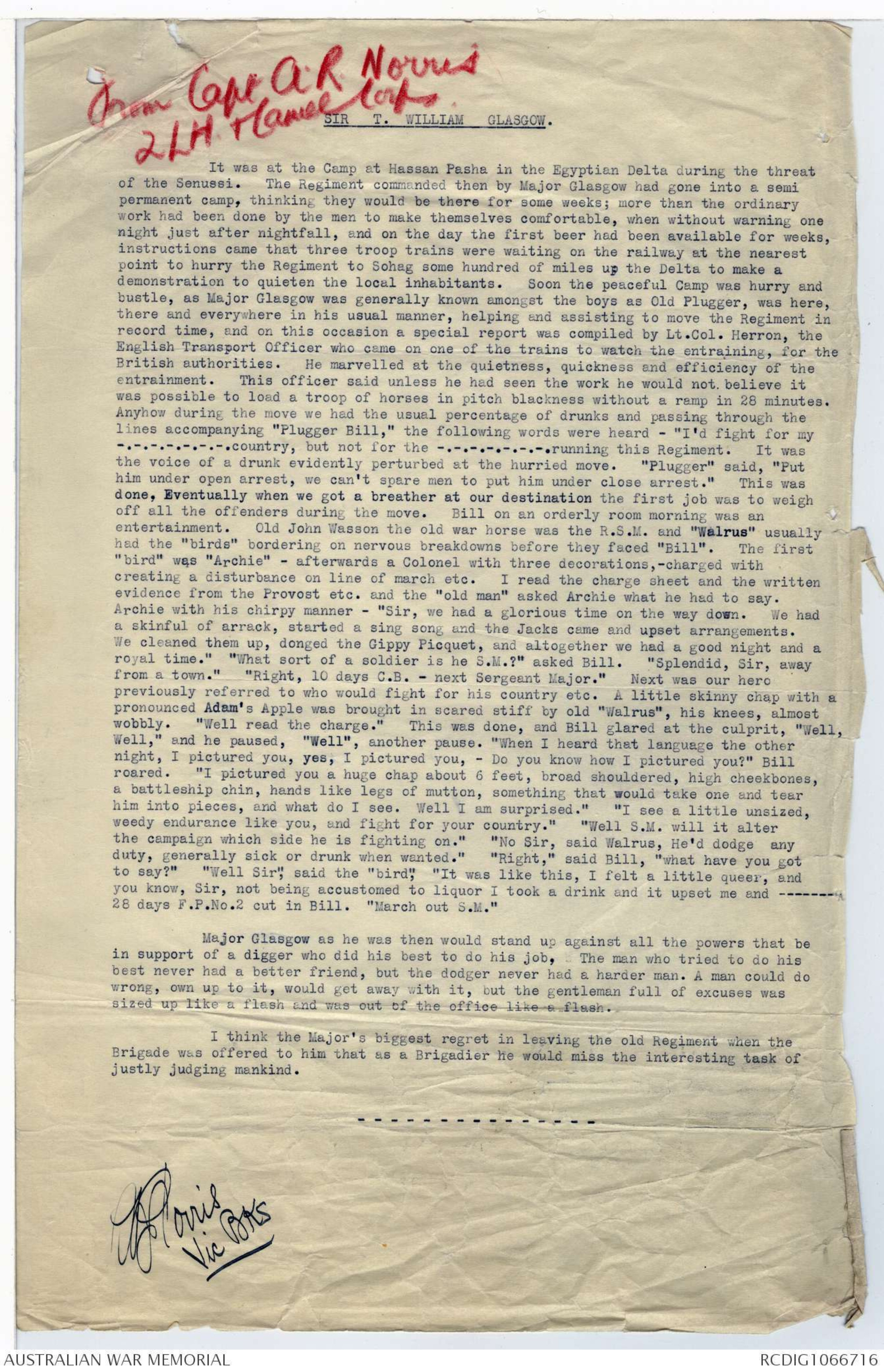
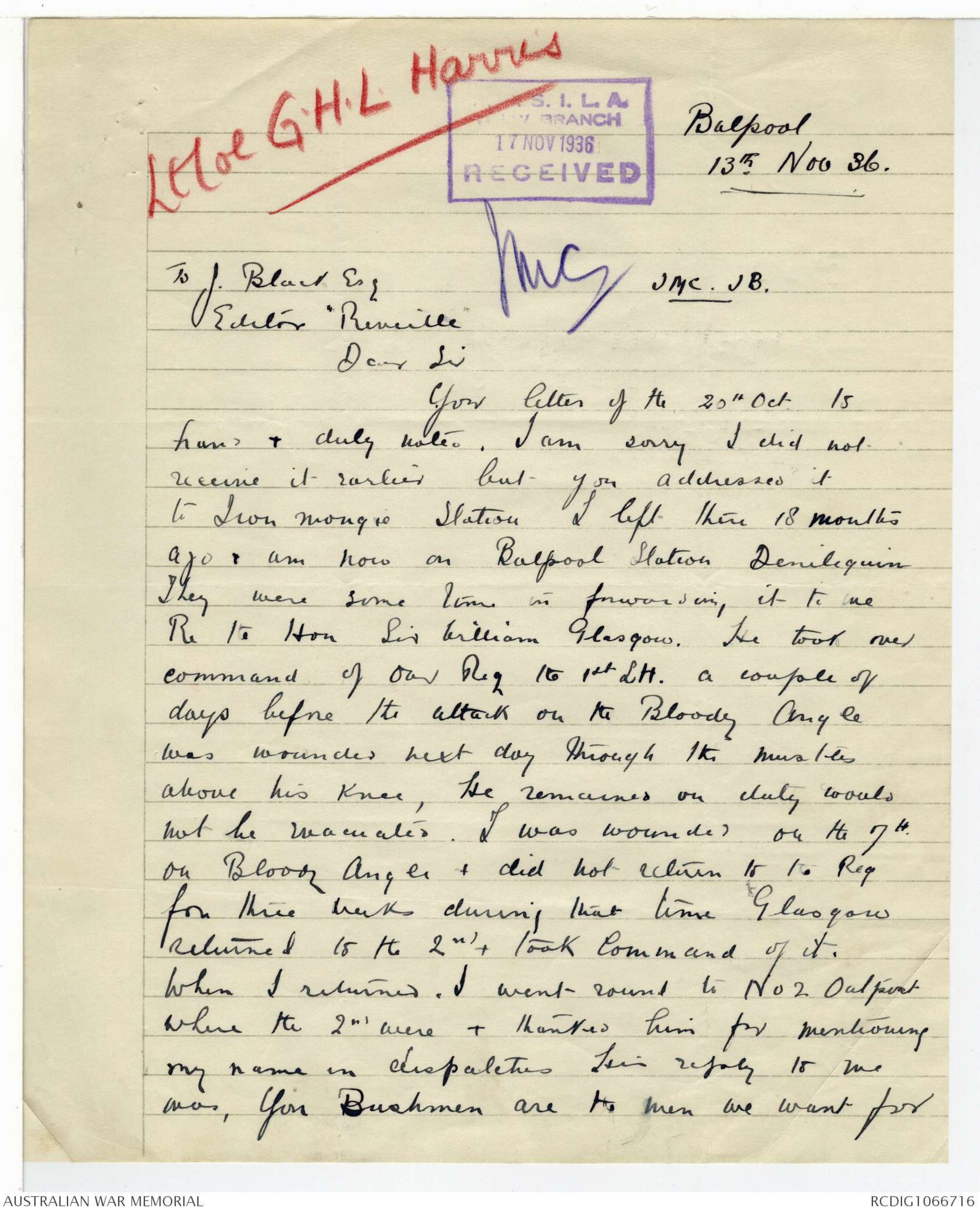
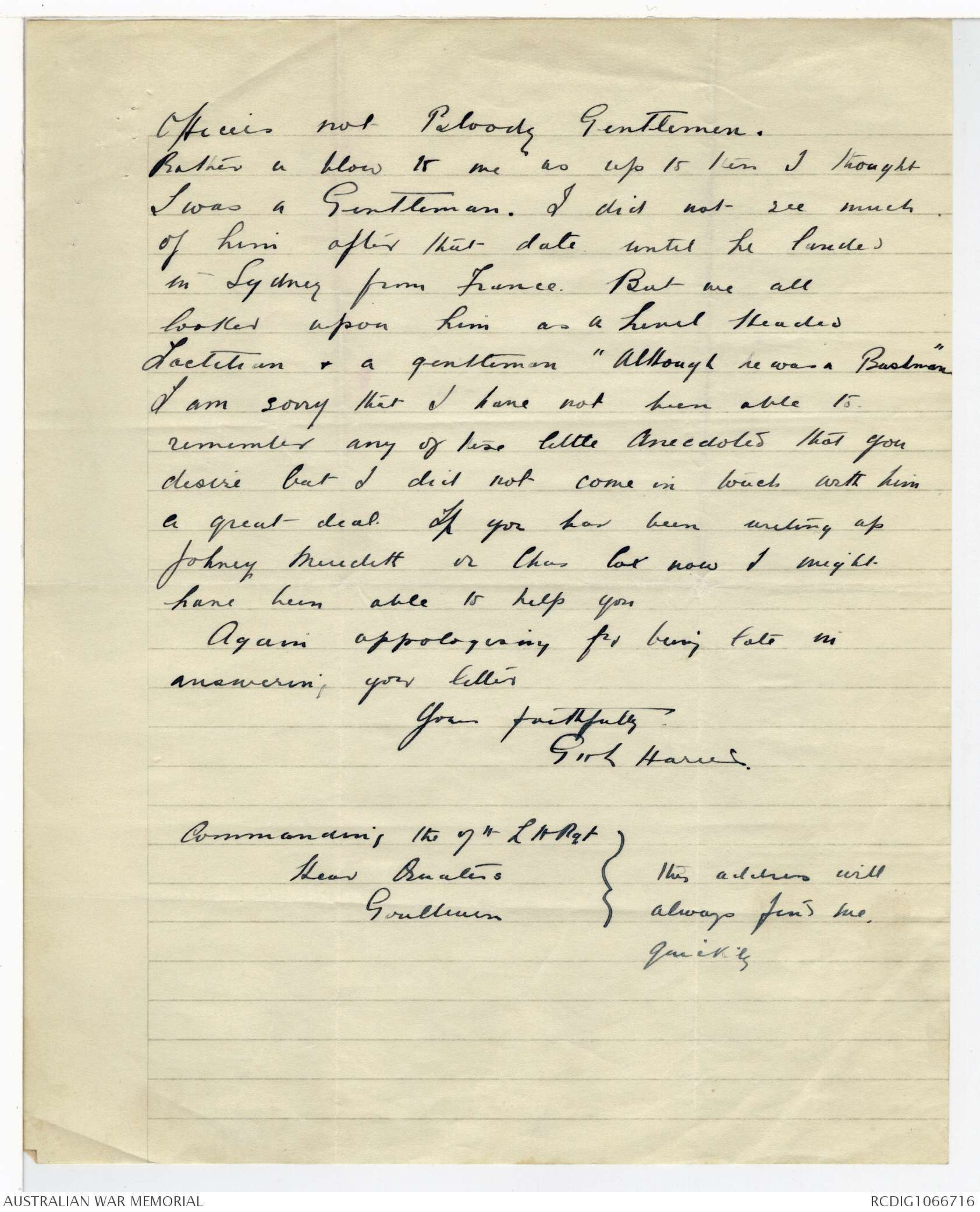
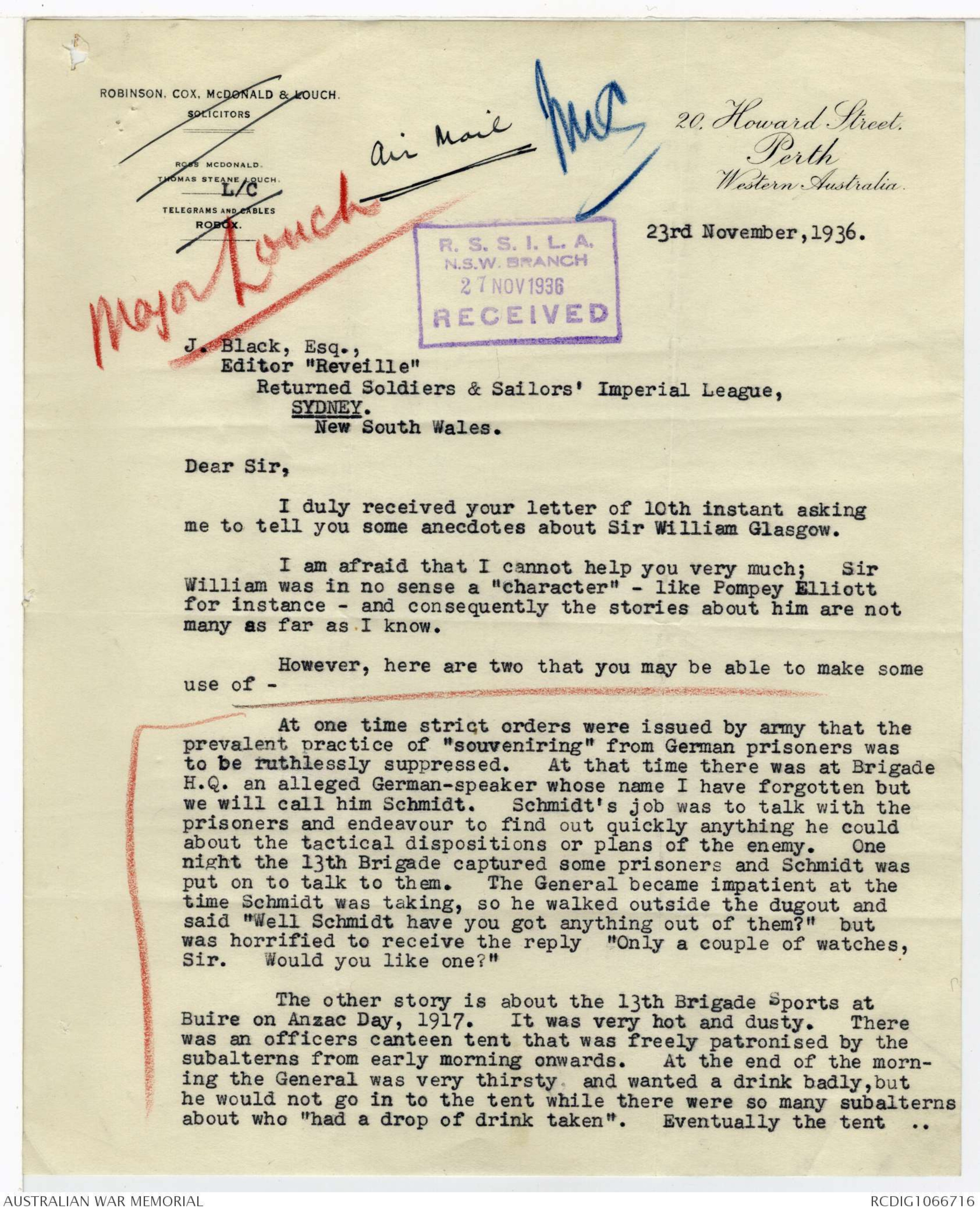
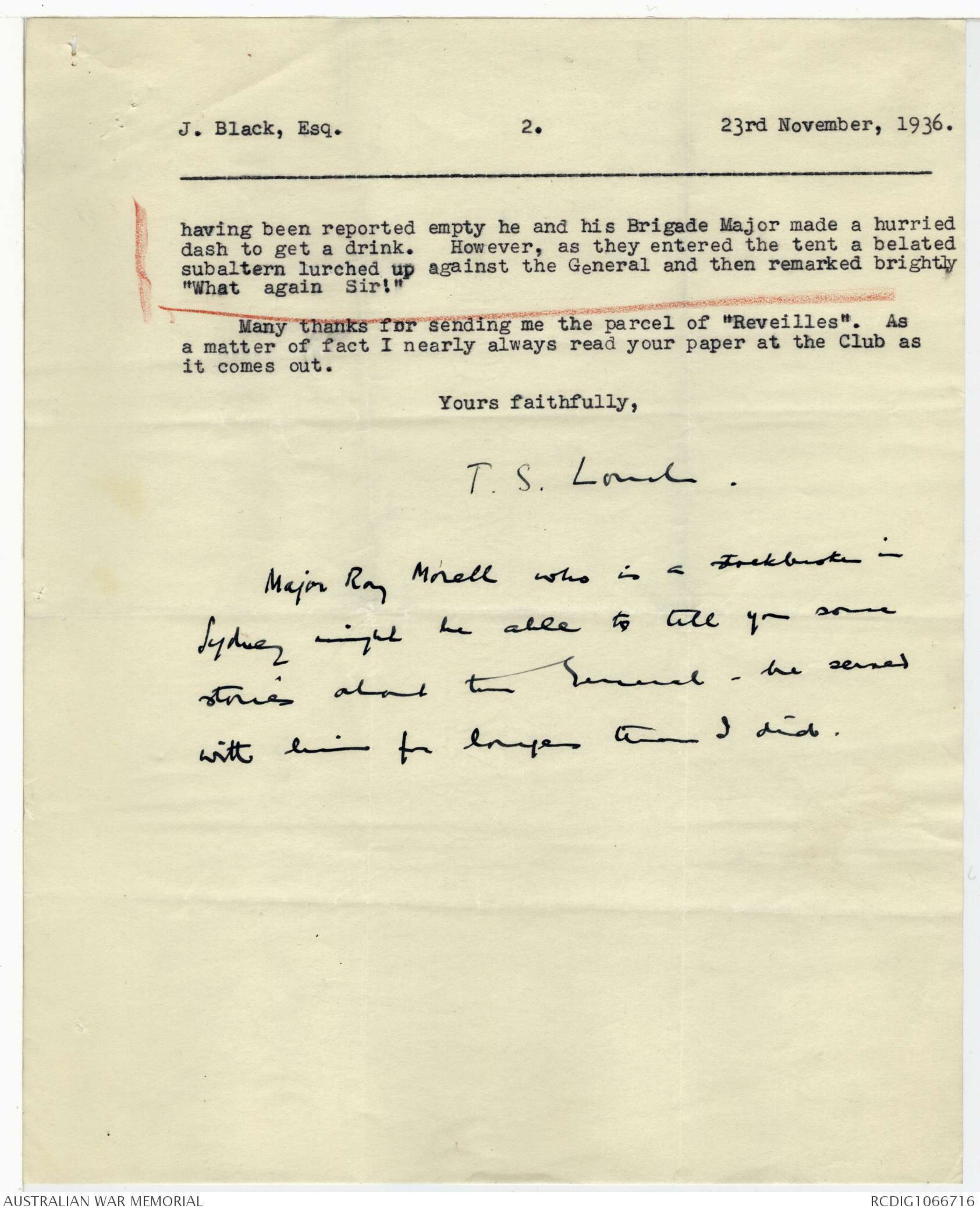
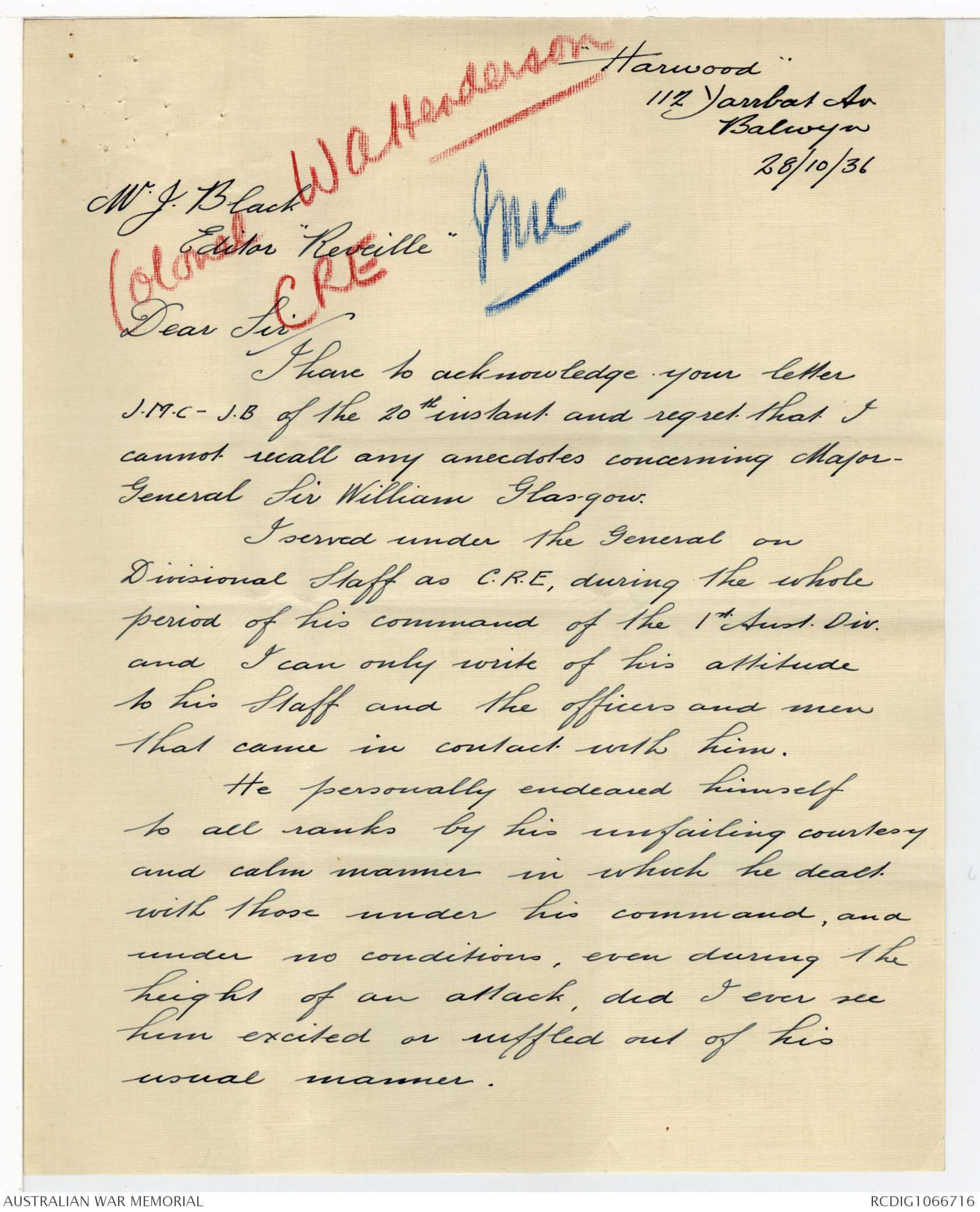
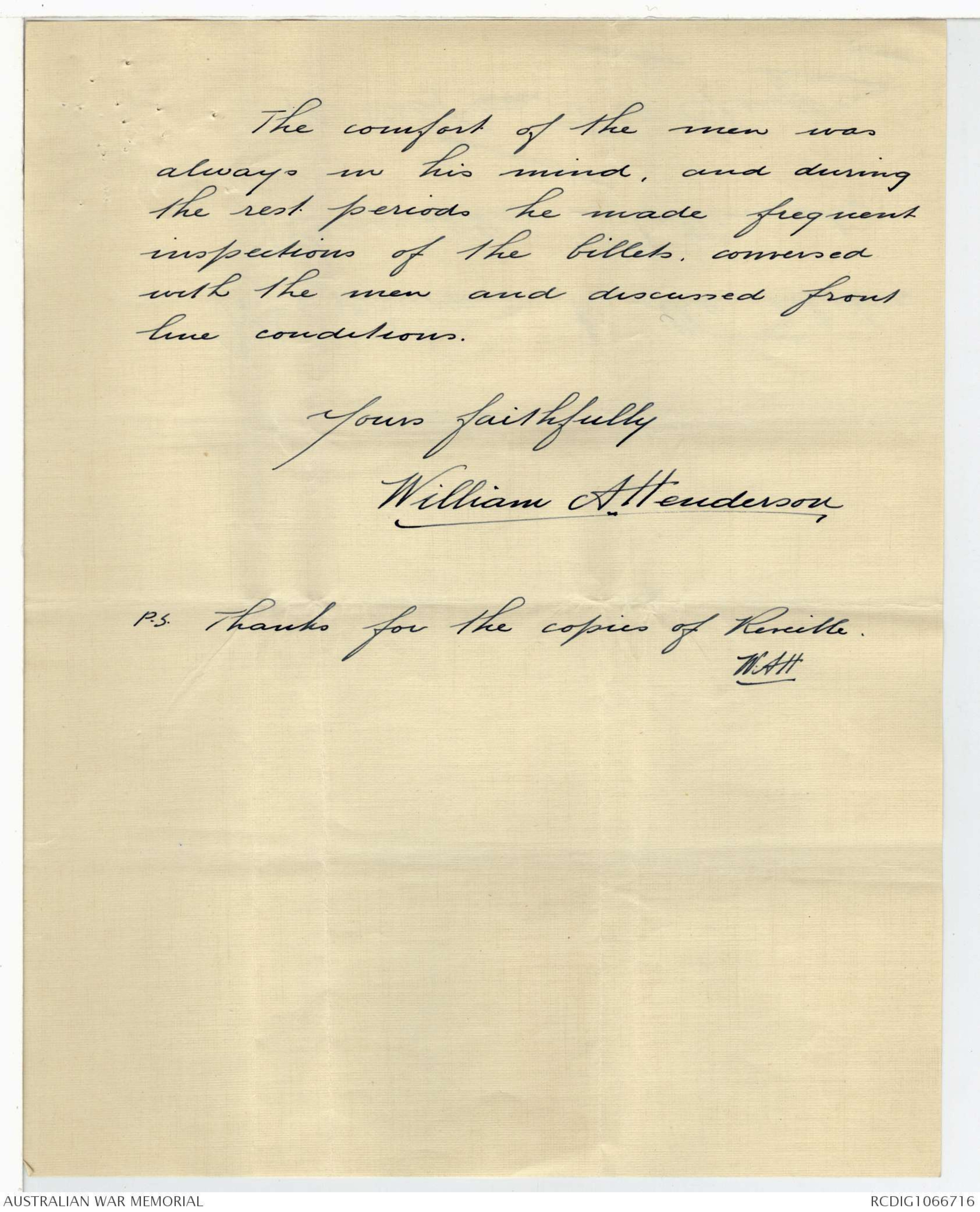
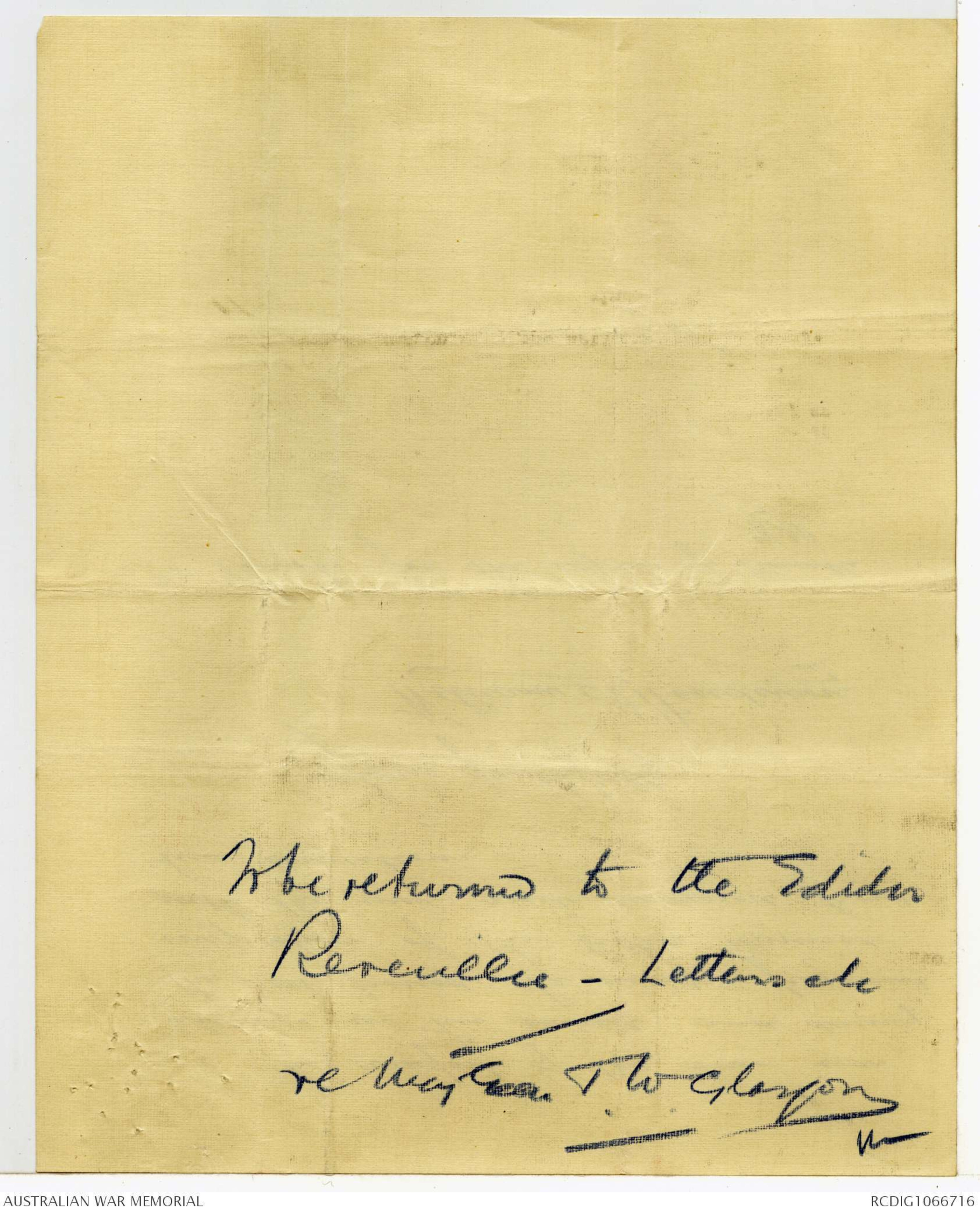
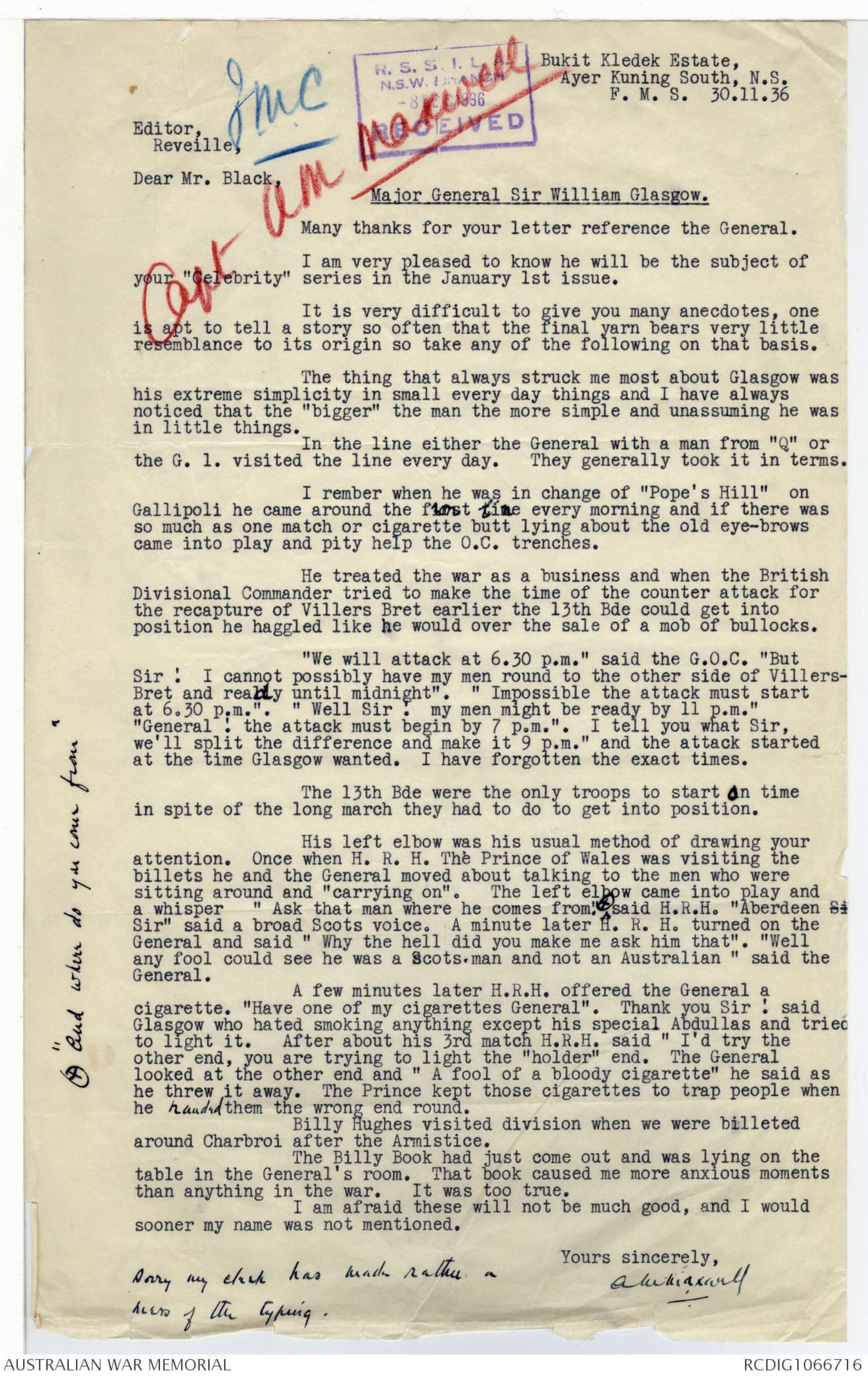
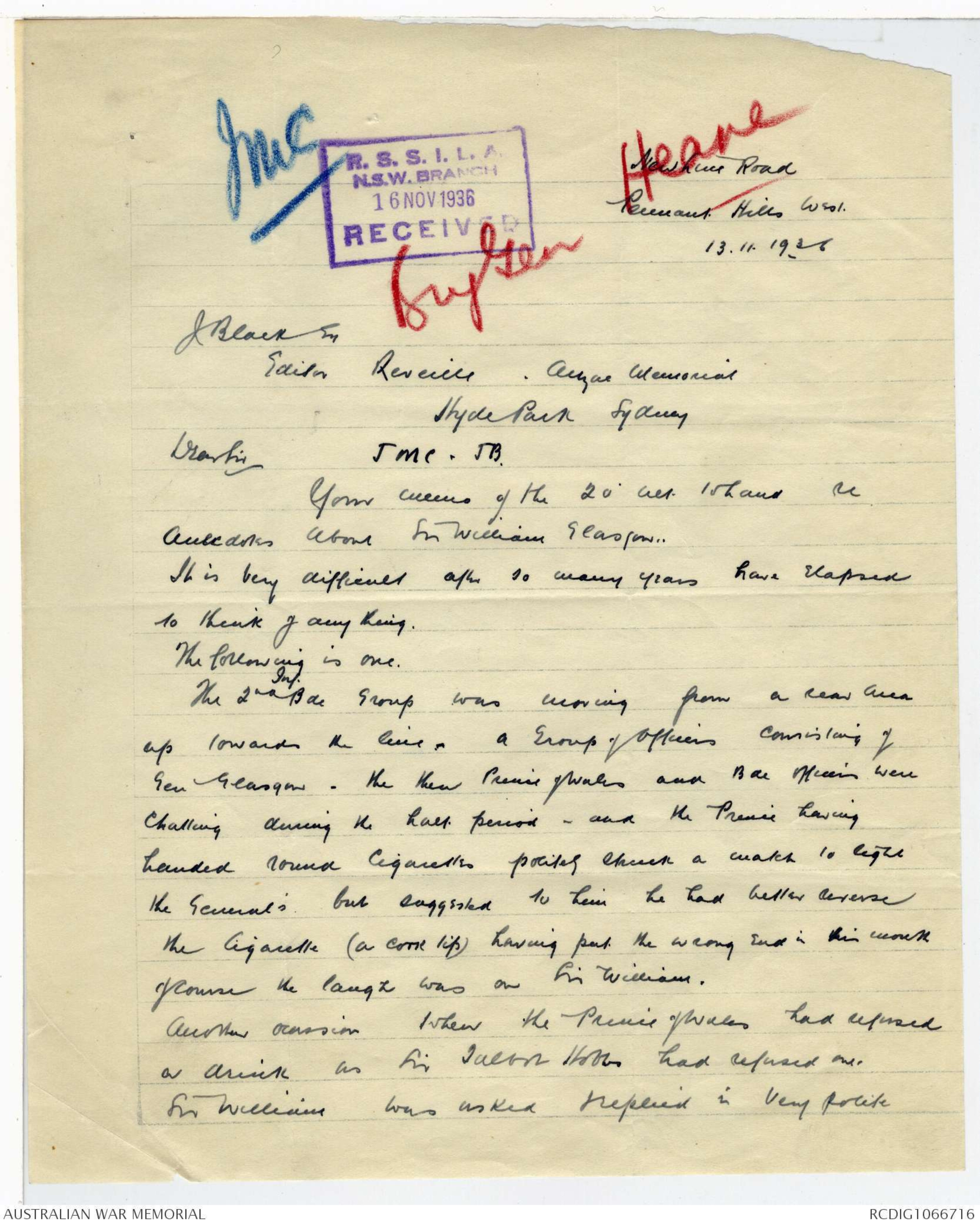
[*From Capt A.R. Norris
2 LH & Camel Corps*]
SIR T. WILLIAM GLASGOW
It was at the Camp at Hassan Pasha in the Egyptian Delta during the threat
of the Senussi. The Regiment commanded then by Major Glasgow had gone into a semi
permanent camp, thinking they would be there for some weeks; more than the ordinary
work had been done by the men to make themselves comfortable, when without warning one
night just after nightfall, and on the day the first beer had been available for weeks,
instructions came that three troop trains were waiting on the railway at the nearest
point to hurry the Regiment to Sohag some hundred of miles up the Delta to make a
demonstration to quieten the local inhabitants. Soon the peaceful Camp was hurry and
bustle, as Major Glasgow was generally known amongst the boys as Old Plugger, was here,
there and everywhere in his usual manner, helping and assisting to move the Regiment in
record time, and on this occasion a special report was compiled by Lt.Col. Herron, the
English Transport Officer who came on one of the trains to watch the entraining, for the
British authorities. He marvelled at the quietness, quickness and efficiency of the
entrainment. This officer said unless he had seen the work he would not believe it
was possible to load a troop of horses in pitch blackness without a ramp in 28 minutes.
Anyhow during the move we had the usual percentage of drunks and passing through the
lines accompanying "Plugger Bill," the following words were heard - "I'd fight for my
-.-.-.-.- country, but not for the -.-.-.-.- running this Regiment. It was
the voice of a drunk evidently perturbed at the hurried move. "Plugger" said, "Put
him under open arrest, we can't spare men to put him under close arrest." This was
done, Eventually when we got a breather at our destination the first job was to weigh
off all the offenders during the move. Bill on an orderly room morning was an
entertainment. Old John Wasson the old war horse was the R.S.M. and "Walrus" usually
had the "birds" bordering on nervous breakdowns before they faced "Bill". The first
"bird" was "Archie" - afterwards a Colonel with three decorations, -charged with
creating a disturbance on line of march etc. I read the charge sheet and the written
evidence from the Provost etc. and the "old man" asked Archie what he had to say.
Archie with his chirpy manner - "Sir, we had a glorious time on the way down. We had
a skinful of arrack, started a sing song and the Jacks came and upset arrangements.
We cleaned them up, donged the Gippy Picquet, and altogether we had a good night and a
royal time." "What sort of a soldier is he S.M.?" asked Bill. "Splendid, Sir, away
from a town." "Right, 10 days C.B. - next Sergeant Major." Next was our hero
previously referred to who would fight for his country etc. A little skinny chap with a
pronounced Adam's Apple was brought in scared stiff by old "Walrus", his knees, almost
wobbly. "Well read the charge." This was done, and Bill glared at the culprit, "Well,
Well," and he paused, "Well", another pause. "When I heard that language the other
night, I pictured you, yes; I pictured you, - Do you know how I pictured you?" Bill
roared. "I pictured you a huge chap about 6 feet, broad shouldered, high cheekbones,
a battleship chin, hands like legs of mutton, something that would take one and tear
him into pieces, and what do I see. Well I am surprised." "I see a little unsized,
weedy endurance like you, and fight for your country." "Well S.M. will it alter
the campaign which side he is fighting on." "No Sir, said Walrus, He'd dodge any
duty, generally sick or drunk when wanted." "Right," said Bill, "what have you got
to say?" "Well Sir"; said the "bird"; "It was like this, I felt a little queer, and
you know, Sir, not being accustomed to liquor I took a drink and it upset me and -----
28 days F.P.No.2 cut in Bill. "March out S.M."
Major Glasgow as he was then would stand up against all the powers that be
in support of a digger who did his best to do his job, . The man who tried to do his
best never had a better friend, but the dodger never had a harder man. A man could do
wrong, own up to it, would get away with it, but the gentleman full of excuses was
sized up like a flash and was out of the office like a flash.
I think the Major’s biggest regret in leaving the old Regiment when the
Brigade was offered to him that as a Brigadier he would miss the interesting task of
justly judging mankind.
----------------------------------------------------------------
AR Norris
Vic Bks
[*Lt Col G.H.L Harris*]
R.S.I.L.A.
NSW BRANCH
17 NOV 1936
RECEIVED*]
[*JMC*]
Balpool
13th Nov 36.
JMC
JMC.JB
To J. Black Esq
Editor "Reveille"
Dear Sir
You letter of the 20th Oct. to
hand & duly noted. I am sorry I did not
receive it earlier but you addressed it
to Iron Mongie Station I left there 18 months
ago & am now on Balpool Station Deniliquin
They were some time in forwarding it to me
Re the Hon Sir William Glasgow. He took over
command of our Reg the 1st LH. a couple of
days before the attack on the Bloody Angle
was wounded next day through the musles
above his knee, He remained on duty would
not be evacuated. I was wounded on the 7th
on Bloody Angle & did not return to the Reg
for three weeks during that time Glasgow
returned to the 2nd & took Command of it.
When I returned. I went round to No2 Outpost
where the 2nd were & thanked him for mentioning
my name in despatches. His reply to me
was, You Bushmen are the men we want for
Officers not Bloody Gentlemen.
Rather a blow to me as up till then I thought
I was a Gentleman. I did not see much
of him after that date until he landed
in Sydney from France. But we all
looked upon him as a Level Headed
tactition & a gentleman "Although he was a Bushman"
I am sorry that I have not been able to
remember any of those little anecdotes that you
desire but I did not come in touch with him
a great deal. If you has been writing up
Johney Murchett or Chas Cox now I might
have been able to help you
Again apologising for being late in
answering you letter
Your faithfully
G.L Harris
Commanding the 7th LH Regt )
Head Quarters ) this address will
Goulburn ) always find me
quickly
[*Major Louch
JMC*]
ROBINSON. COX, MCDONALD & ROUCH.
SOLICITORS
Air Mail
20. Howard Street.
Perth
Western Australia
ROSS MCDONALD
THOMAS STEANE LOUCH
L/C
TELEGRAPSH AND CABLES
ROBOX
23rd November, 1936.
R.S.S.l.L.A.
N.S.W.BRANCH
27 NOV 1336
RECEIVED
J. Black, Esq.,
Editor "Reveille"
Returned Soldiers & Sailors’ Imperial League,
SYDNEY.
New South Wales.
Dear Sir,
1 duly received your letter of 10th instant asking
me to tell you some anecdotes about Sir William Glasgow.
I am afraid that I cannot help you very much; Sir
William was in no sense a "character" - Like Pompey Elliott
for instance - and consequently the stories about him are not
many as far as I know.
However, here are two that you may be able to make some
use of -
At one time strict orders were issued by army that the
prevalent practice of "souveniring" from German prisoners was
to be ruthlessly suppressed. At that time there was at Brigade
H.Q. an alleged German-speaker whose name I have forgotten but
we will call him Schmidt. Schmidt's job was to talk with the
prisoners and endeavour to find out quickly anything he could
about the tactical dispositions or plans of the enemy. One
night the 13th Brigade captured some prisoners and Schmidt was
put on to talk to them. The General became impatient at the
time Schmidt was taking, so he walked outside the dugout and
said "Well Schmidt have you got anything out of them?" but
was horrified to receive the reply "Only a couple of watches,
Sir. Would you like one?"
The other story is about the 13th Brigade Sports at
Buire on Anzac Day, 1917.It was very hot and dusty. There
was an officers canteen tent that was freely patronised by the
subalterns from early morning onwards. At the end of the morning
the General was very thirsty and wanted a drink badly, but
he would not go in to the tent while there were so many subalterns
about who "had a drop of drink taken". Eventually the tent
23rd November, 1936.
20
J. Black, Esq.
having been reported empty he and his Brigade Major made a hurried
dash to get a drink. However, as they entered the tent a belated
subaltern lurched up against the General and then remarked brightly
"What again Sir!"
Many thanks for sending me the parcel of "Reveilles". As
a matter of fact I nearly always read your paper at the Club as
it comes out.
Yours faithfully,
T. S. Loud
Major Roy Morell who is a stockbroker in
Sydney might he able to tell you some
stories about the General - he served
with him for longer than I did.
[[*Colonel WA Henderson
CRE]]
[[*JMC]]
Harwood
112 Yarrbat Av
Balwyn
28/10/36
Mr J. Black
Editor "Reveille"
Dear Sir
I have to acknowledge your letter
J.M.C-J.B of the 20th instant and regret that I
cannot recall any anecdotes concerning Major-
General Sir William Glasgow.
I served under the General on
Divisional Staff as C.R.E, during the whole
-period of his command of the 1st Aust. Div.
and I can only write of his attitude
to his Staff and the officers and men
that came in contact with him.
He personally endeared himself
to all ranks by his unfailing courtesy
and calm manner in which he dealt
with those under his command, and
under no conditions, even during the
height of an attack did I ever see
him excited or ruffled out of his
usual manner.
the comfort of the men was
always in his mind, and during
the rest periods he made frequent
inspections of the billets, conversed
with the men and discussed front
line conditions.
Yours faithfully
William A. Henderson
P.S. Thanks for the copies of Reveille
WAH
To be returned to the Editor
Reveille - Letters etc
re Maj Gen T.W Glasgow
Bukit Kledek Estate,
Ayer Kuning South, N.S.
[[*Capt A M Maxwell]]
[[*JMC]]
Editor,
Reveille,
Dear Mr. Black,
Major General Sir William Glasgow.
Many thanks for your letter reference the General.
I am very pleased to know he will be the subject of
your "Celebrity" series in the January 1st issue.
It is very difficult to give you many anecdotes, one
is apt to tell a story so often that the final yarn bears very little
resemblance to its origin so take any of the following on that basis.
The thing that always struck me most about Glasgow was
his extreme simplicity in small every day things and I have always
noticed that the "bigger" the man the more simple and unassuming he was
in little things.
In the line either the General with a man from "Q" or
the G. l. visited the line every day. They generally took it in terms.
I rember when he was in change of "Pope's Hill" on
Gallipoli he came around the first line every morning and if there was
so much as one match or cigarette butt lying about the old eye-brows
came into play and pity help the O.C. trenches.
He treated the war as a business and when the British
Divisional Commander tried to make the time of the counter attack for
the recapture of Villers Bret earlier the 13th Bde could get into
position he haggled like he would over the sale of a mob of bullocks.
"We will attack at 6.30 p.m." said the G.O.C. "But
Sir! I cannot possibly have my men round to the other side of Villers-
Bret and ready until midnight". "Impossible the attack must start
at 6.30p.m.". "Well Sir! my men might be ready by 11p.m."
"General! the attack must begin by 7 p.m.". I tell you what Sir,
we' 11 split the difference and make it 9 p.m. and the attack started
at the time Glasgow wanted. I have forgotten the exact times.
The 13th Bde were the only troops to start on time
in spite of the long march they had to do to get into position.
His left elbow was his usual method of drawing your
attention. Once when H. R. H. The Prince of Wales was visiting the
billets he and the General moved about talking to the men who were
sitting around and "carrying on". The left elbow came into play and
a whisper "Ask that man where he comes from ."(x) said H.R.H. "Aberdeen Si
Sir" said a broad Scots voice. A minute later n. R. H. turned on the
General and said "Why the hell did you make me ask him that". "Well
any fool could see he was a Scots-man and not an Australian" said the
General.
A few minutes later H.R.H. offered the General a
cigarette. "Have one of my cigarettes General". Thank you Sir! said
Glasgow who hated smoking anything except his special Abdullas and tried
to light it. After about his 3rd match H.R.H. said "I'd try the
other end, you are trying to light the "holder" end. The General
looked at the other end and "A fool of a bloody cigarette" he said as
he threw it away. The Prince kept those cigarettes to trap people when
he handed them the wrong end round.
Billy Hughes visited division when we were billeted
around Charbroi after the Armistice.
The Billy Book had just come out and was lying on the
table in the General's room. That book caused me more anxious moments
than anything in the war. It was too true.
I am afraid these will not be much good, and I would
sooner my name was not mentioned.
Yours sincerely,
A M Maxwell
Sorry my clerk has made rather a
mess of the typing.
[[* (x) "and where do you come from"
R.S.S.I.L.A.
N.S.W. BRANCH'16 NOV 1936
RECEIVED
[[*JMC]]
[[*Brig Gen Heane]]
New Line Road
Pennant Hills West
13.11.1936
J Black Esq
Editor Reveille. Anzac Memorial
Hyde Park Sydney
Dear Sir, JMC.JB
Your [[?]] of the 20 Oct [[?]] re
anecdotes about Sit William Glasgow.
It is very difficult after so years have elapsed
to think of anything.
The following is one.
The 2nd ^Inf Bde Group was moving from a rear area
up towards the line and a Group of Officers consisting of
Gen Glasgow & the then Prince of Wales and Bde Officers were
chatting during the halt period and the Prince having
handed around cigarettes politely struck a match to light
the General's but suggested to him he had better reverse
the Cigarette (a cork lip) having put the wrong end in his mouth
Of course the laugh was on Sir William.
Another occasion when the Prince of Wales had refused
a drink as Sir Talbot Hobbs had refused one.
Sir William was asked replied in very polite
 H.Boutell
H.BoutellThis transcription item is now locked to you for editing. To release the lock either Save your changes or Cancel.
This lock will be automatically released after 60 minutes of inactivity.